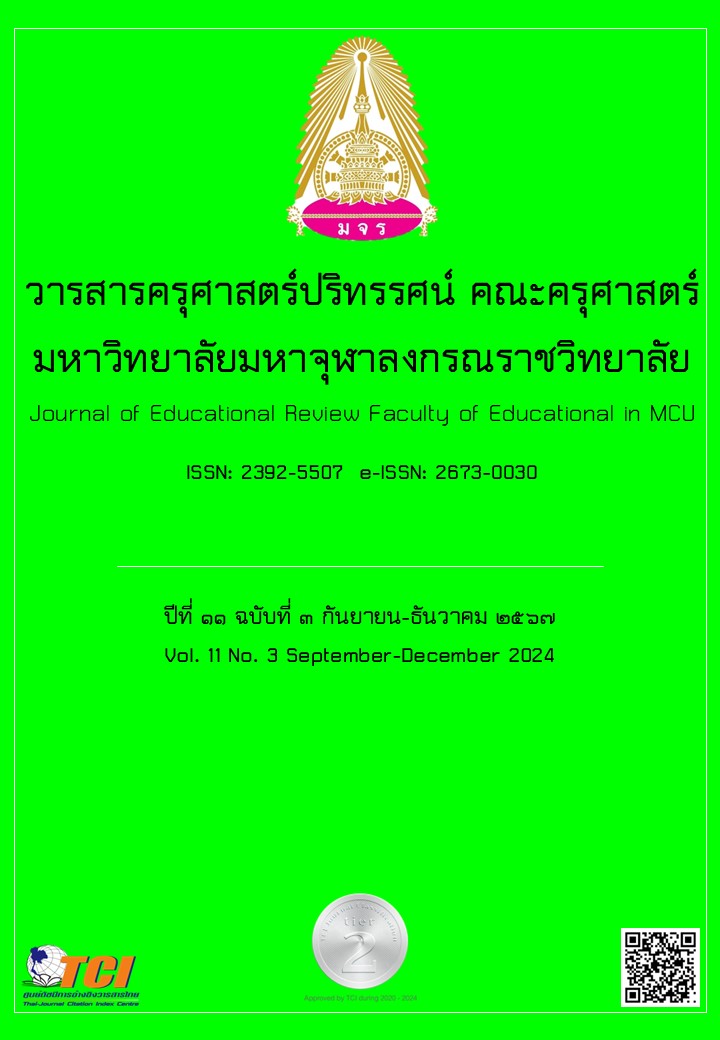GUIDELINES FOR ACADEMIC ADMINISTRATION IN THE 21ST CENTURY OF SCHOOL ADMINISTRATORS IN PHICHIT ELEMENTARY EDUCATION AREA 2 ACCORDING TO THE PRINCIPLE OF IDDHIPÀDA 4
Main Article Content
Abstract
This research aims to 1) study the state of academic administration in the 21st century of school administrators, 2) compare the opinions of school administrators and teachers on academic administration in the 21st century of school administrators based on personal factors, and 3) find a guideline for academic administration in the 21st century of school administrators based on the principle of the Iddipda (Four Basis for Success). This research was a mixed-methods study, collecting quantitative data from 361 sample questionnaires, finding the frequency, percentage, mean, and standard deviation. Then, the hypothesis testing was compared using the t-test and the F-test using the One Way ANOVA. The qualitative data were collected by interviewing 9 key informants and analyzing the data using content analysis. The research results found that 1) The state of academic administration in the 21st century of school administrators was at a moderate level overall. When considering each aspect, it was found that the aspect with the highest mean was educational supervision at a moderate level, followed by teaching and learning management at a moderate level, and the aspect with the lowest mean was educational media, innovation, and technology was at the moderate level, respectively. 2) The result of comparing the opinions of educational administrators and teachers on academic administration in the 21st century of educational administrators classified by gender, education level, and work experience found that educational administrators and teachers with different education levels and work experience had no different opinions significantly at the .05 statistical level. As for gender, it was found that educational administrators and teachers with different genders had different opinions on educational supervision at the .05 statistical level. 3) The guidelines for academic administration in the 21st century of educational administrators according to the Iddipda principle (Four Basis for Success) were as following: (1) School curriculum development; School administrators must systematically plan the development of the school curriculum, supervise, follow up on the development results, and use the evaluation results of the school curriculum for continuous development, be attentive, determined, and jointly develop the school curriculum systematically. (2) Teaching and learning management; School administrators should continuously organize PLC to help enhance teachers' skills and creativity, and inspire teachers to teach happily and with determination, and intend to develop the quality of education. (3) Educational supervision; School administrators must systematically plan and prepare for educational supervision in the school, participate in supervision within the school with teachers, provide advice, suggestions, assistance, and build confidence, encourage teachers to develop their work further. (4) Educational media, innovation and technology; Educational institution administrators must have knowledge of media, innovation and technology, aid and support with an appropriate budget, create love and satisfaction, be attentive, determined and responsible with diligence, and consider the greatest benefit to students, teachers and the educational institution. (5) Research to develop educational quality; Educational institution administrators should plan training in research to develop educational quality by surveying teachers’ needs and satisfaction in areas that teachers are interested in and want to develop themselves, building morale, encouragement, and caring, and aiding and support to teachers when teachers encounter problems with educational research. (6) Measurement and evaluation of learning outcomes; Educational institution administrators should determine guidelines for measurement and evaluation of learning outcomes of the educational institution, promote the use of supervision results to continuously improve measurement and evaluation of learning outcomes, determine guidelines for development to solve teachers’ problems, create satisfaction, and strengthen determination and intention by analyzing data and organizing the information system for easy use.
Article Details

This work is licensed under a Creative Commons Attribution-NonCommercial-NoDerivatives 4.0 International License.
ทัศนะและความคิดเห็นที่ปรากฏในบทความในวารสารฉบับนี้ถือเป็นความรับผิดชอบของผู้เขียนบทความนั้นเพียงผู้เดียว และไม่ถือเป็นทัศนะและความรับผิดชอบของกองบรรณาธิการ
กองบรรณาธิการขอสงวนสิทธิ์ในการคัดเลือกบทความลงตีพิมพ์และจะแจ้งให้เจ้าของบทความทราบหลังจากผู้ประเมินบทความตรวจอ่านบทความแล้ว
ต้นฉบับที่ได้รับการตีพิมพ์ในวารสารครุศาสตร์ปริทรรศน์ คณะครุศาสตร์ มหาวิทยาลัยมหาจุฬาลงกรณราชวิทยาลัย ถือเป็นกรรมสิทธิ์ของคณะครุศาสตร์ มหาวิทยาลัยมหาจุฬาลงกรณราชวิทยาลัย ห้ามนำข้อความทั้งหมดหรือบางส่วนไปพิมพ์ซ้ำ เว้นเสียแต่ว่าจะได้รับอนุญาตจากมหาวิทยาลัยฯ เป็นลายลักษณ์อักษร
References
ปรียาพร วงศ์อนุตรโรจน์. (2553). การบริหารงานวิชาการ. กรุงเทพมหานคร: ศูนย์สื่อเสริมกรุงเทพ.
ยุพิน ขุนทอง. (2557). การบริหารงานวิชาการสู่ความเป็นเลิศตามหลักอิทธิบาท 4 ในสถานศึกษาขั้นพื้นฐาน สังกัดสำนักงานเขตพื้นที่การศึกษามัธยมศึกษาเขต 25. วิทยานิพนธ์พุทธศาสตรมหาบัณฑิต. มหาวิทยาลัยมหาจุฬาลงกรณราชวิทยาลัย.
วิจารณ์ พานิช. (2555). วิถีสร้างการเรียนรู้เพื่อศิษย์ในศตวรรษที่ 21. กรุงเทพมหานคร: มูลนิธิสดศรีสฤษดิ์วงศ์.
สำนักงานเขตพื้นที่การศึกษาประถมศึกษาพิจิตร เขต 2. (2566). รายงานผลการดำเนินงานประจำปีงบประมาณ 2565. แหล่งที่มา: https://www.phichit2.go.th/?p=16697 สืบค้นเมื่อ 24 เม.ย. 2566.
สุทัศน์ สังคะพันธ์. (2557). ทำไมต้องทักษะในศตวรรษที่ 21 ในบทความทักษะแห่งศตวรรษที่ 21. มหาสารคาม: มหาวิทยาลัยมหาสารคาม.


